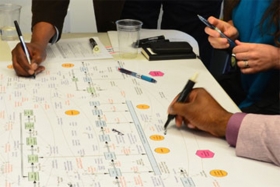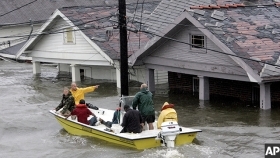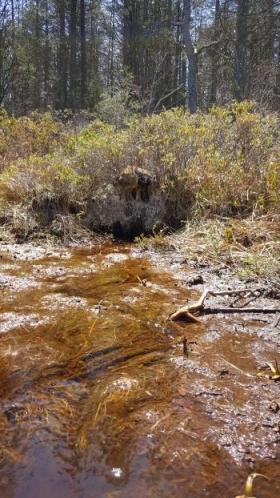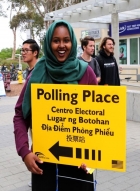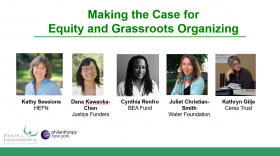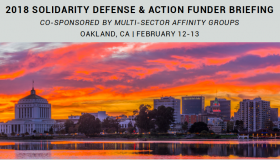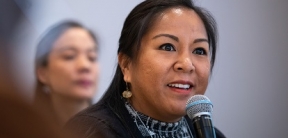You are here
HEFN’s 2018 Year in Review

Advancing Solutions
One of HEFN’s three core strategies is to help funders learn about and collaborate in addressing critical environmental health and justice problems, often in partnership with HEFN members and other philanthropy-supporting organizations. Priorities for HEFN’s 2018 “advancing solutions” work included tackling toxics; addressing impacts of oil and gas; safeguarding drinking water and children’s environmental health; and promoting health and equity in addressing climate change.
- Accelerating transitions from toxic to safer chemicals and materials.
HEFN shared results via an early 2018 webinar of its 2017 survey assessing the communication capacity of nearly 80 groups working on toxics and pesticides issues, with survey support from the Broad Reach Fund and contributions by the Science Communication Network. HEFN's Catalysts email group supported peer exchange throughout the year on toxics and green chemistry grantmaking interests.
Helping funders follow federal developments on toxics issues, HEFN hosted a webinar with the Environmental Grantmakers Association (EGA) on NGO campaigning related to a key EPA appointee, as well as one with Rachel’s Network on strategies to address concerns over EPA’s implementation of the updated Toxic Substances Control Act. The year’s programming also highlighted other toxics advocacy, organizing, and science. A Jenifer Altman Foundation-moderated webinar featured updates on transatlantic toxics advocacy collaboration. The Garfield Foundation partnered with HEFN to share progress in the Cancer Free Economy Network’s systems-framed work to accelerate moves away from chemicals causing cancer and other chronic diseases, organizing a webinar and blog posts on “Connecting Health and Environment Solutions Across Sectors and Communities” and “Pittsburgh’s Global City Aspirations with Communities’ Health.”HEFN brought its experience helping funders understand the health impacts of environmental exposures to consideration of two emerging issues. A webinar planned with members including Jonas Philanthropies reviewed the state of science on health concerns related to electromagnetic frequency (EMF) exposures. Health, environmental, and other concerns about laboratory-created meat were explored in a webinar co-sponsored with the Sustainable Agriculture and Food Systems Funders, Animal Grantmakers, Nell Newman Foundation, 11th Hour Project, GRACE Communications Foundation, and TomKat Foundation.
Fine Fund Chair and HEFN Steering Committee member Carolyn Fine Friedman expanded HEFN’s connections to the “lean” (no- or small-staffed foundations) with an Exponent Philanthropy blog post about how her environmental health grantmaking is helping speed the replacement of hazardous products with safer ones in the marketplace.
- Addressing health, environmental, and community impacts of the oil, gas, and petrochemicals economy.
By hosting monthly calls, this HEFN group kept members and other funders updated on issue developments and field responses in areas including: petrochemical industry expansion and impacts on the Ohio River Valley; a proposed Trans Mountain Pipeline in the Pacific Northwest; oil and gas industry financial vulnerabilities; the Federal Energy Regulatory Commission; Appalachian petrochemical development; a people’s oil and gas movement; and the Break Free From Plastics movement. HEFN staff and members expanded relationships with funder and field partners, including by participating in several national meetings.
- Improving health and equity outcomes by addressing climate change.
Through programming, communications, and outreach, HEFN built on previous years’ work to expand philanthropic focus on health and equity issues related to climate change. With climate-related droughts, wildfires, hurricanes, and flooding affecting many communities across the U.S., HEFN’s email group for funders interested in climate, health, and equity issues grew by 17 percent.
HEFN’s Jeff Wise authored a blog post for Health Affairs’ GrantWatch with highlights of a late-2017 meeting on “Charting a Climate, Health, and Equity Agenda: Investing in Those Most Impacted to Improve Health and the Environment.” HEFN staff shared takeaways from that event at a spring 2018 funder meeting co-hosted by the Kresge Foundation and the Public Health Funder Network - American Public Health Association.For the June 2018 Grantmakers In Health (GIH) annual conference, HEFN Executive Director Kathy Sessions moderated a climate-focused salon session featuring the Kresge Foundation, California Wellness Foundation (both HEFN members), and the Robert Wood Johnson Foundation. In September, staff and several members participated in the Global Climate Action Summit and related civil society events; HEFN hosted a funder call afterwards for participants to share reports with interested colleagues. In consultations throughout the year, members and staff worked with other funder and funder group partners to assess philanthropic needs and opportunities, leading to the development of a new three-year HEFN project to expand investment in those most impacted by climate change.
- Improving children’s and communities’ environmental health, including through a focus on access to safe, affordable, accessible drinking water.
Network staff and members were active in an informal funder group exploring ideas for scaling up collaboration and investments reducing childhood lead exposure, including at a spring 2018 meeting hosted by The JPB Foundation and in several subsequent calls. HEFN led planning for the group’s in-person convening in November 2018, organizing the event in tandem with HEFN’s 2018 Annual Meeting in Pittsburgh. That “Philanthropic Collaboration to Prevent Lead Poisoning” meeting convened more than 20 funders for a day-long program, including conversations with the local public health director, Get the Lead Out Pittsburgh Coalition leaders, and a representative of the US Housing and Urban Development, Healthy Homes and Hazard Control Office, followed by an afternoon of peer updates and strategy discussion.
Building Leadership
Strengthening field leadership and philanthropic champions is the focus of a second HEFN strategy to mobilize philanthropy around environmental health and justice solutions.HEFN showcased partnerships between its members and their grantees that are building grassroots leadership and power in a webinar on environmental health and justice-related civic engagement work. This “C3” discussion featured speakers from Solidago Foundation and its grantee partner, the New Virginia Majority; as well as from The California Wellness Foundation and its partner, the Environmental Health Coalition.
HEFN hosted a five-month community of practice program in 2018 to strengthen funder skills at “making the case” for advancing equity and grassroots organizing through environmental health grantmaking. A cohort of eight funder participants and two HEFN staff members honed their cases and case-making skills in two retreats and several video-conference calls, with expert coaches from the Justice Funders.
HEFN then drew upon that “Making the Case” community of practice work to share lessons and tools with other funders. A lively HEFN-hosted workshop on “Making the Case for Racial and Gender Equity in Grantmaking” was offered at the 2018 Grantmakers In Health (GIH) conference, featuring HEFN members as funder faculty, including from the California Wellness Foundation, the Kresge Foundation, the New York Community Trust, and The Heinz Endowments. HEFN hosted a similar workshop at the Exponent Philanthropy’s 2018 National Conference in Philadelphia, drawing on cohort participants from the Ceres Trust, GRACE Communications Foundation, John Merck Fund, and the Building Equity and Alignment for Impact (BEA) Fund as funder faculty.A fall 2018 webinar cosponsored by Philanthropy New York further shared lessons from the 2018 Making the Case Community of Practice. Presentations by Kathy Sessions and other cohort members from the Water Foundation, Ceres Trust, and the BEA Fund offered ideas for helping varied funder decision-makers understand the value of equity-advancing grants to specific foundation goals.
The network’s interest in building grassroots field leadership sparked a Field Partner pilot program, through which HEFN members were invited to bring one grantee as their guest to the 2018 HEFN Annual Meeting. A blog post before the meeting -- on “A Personal Invitation to Help Build the Environmental Health and Justice Majority,” by Shorey Myers, Executive Director of the Jenifer Altman Foundation and HEFN Steering Committee member – introduced the pilot program. After the meeting, a December blog post “Partners for Learning and Action Shape HEFN 2018 Annual Meeting” reported on the success of this pilot program.To deepen its own funder leadership, HEFN supported its Steering Committee with a training retreat and coaching on diversity, equity, and inclusion. The Steering Committee brought coach Bina Patel of Saathi Impact Consulting to host a funder dinner conversation on racial equity at the HEFN 2018 meeting.
The HEFN community, saddened by the 2018 passing of toxics advocacy leader Andy Igrejas, celebrated his contributions in a March blog post and paid tribute at the HEFN annual meeting.
Expanding Investments
HEFN’s third strategic focus is on expanding investments in environmental health and justice. Many 2018 activities supported this goal, reaching funders and donors with outreach and communications, informing them through programming, and deepening their engagement and investments through funder consultations and collaboration. Recognizing that donor advised funds are the fastest-growing segment of philanthropy, HEFN used a planning grant from the Garfield Foundation to develop a pilot project to undertake major donor outreach with a group of toxics-focused NGO partners. For information on this pilot project, launched in 2019, email hefn@hefn.org.To track progress towards its investment expansion goals, in 2018 HEFN continued a partnership with EGA to add HEFN members’ giving data to the EGA Tracking the Field (TTF) database. The partnership enabled HEFN members to access grants data via a portal on HEFN’s website. HEFN and EGA improved the database’s relevance by adding an expanded taxonomy making it easier to track and search for grants related to specific environmental health issues or ones targeting highly impacted populations. The HEFN 2018 meeting (and a January 2019 webinar) provided reports on over $370 million in 2016 grants tracked on issues like oil and gas development, toxics and safer chemicals, drinking water and air quality, environmental justice, climate change and health.
Learning and Networking
A busy year of programming and strategic collaboration culminated in HEFN’s 2018 HEFN Annual Meeting. The event drew over 60 grantmakers and field partners to Pittsburgh, Pennsylvania, for a meeting focused on building “The Environmental Health and Justice Majority.”Keynote speaker Grant Oliphant, president of The Heinz Endowments (pictured, second photo from left), opened the convening by challenging funders to be courageous in tackling systemic inequity and contemporary threats to a healthy democracy. Plenary sessions included a post-election debrief and sessions exploring ideas for turning people’s common concerns – like for healthy food, safe drinking water, and clean air – into a more powerful, multiracial majority able to defend environmental health and justice. Participants chose between two “deep dive” site visits for an afternoon, one focused on the petrochemical economy and another on strategies to combat air and water pollution. The new Field Partners pilot program brought 11 grantees to the Annual Meeting, enriching the discussions and strengthening relationships.
Members and Leaders
The network was guided throughout the year by a phenomenal Steering Committee, led by co-chairs Amy Panek (Park Foundation) and Jalonne L. White-Newsome (Kresge Foundation). At year’s end, members and staff bestowed deep appreciations and coveted “HEFN Hero” jackets on two Steering Committee members finishing their terms in 2018: Carolyn Fine Friedman, the Fine Fund (pictured left, top), and chair emeritus Phil Johnson, The Heinz Endowments (pictured left, middle).An annual meeting reception also celebrated long-time HEFN member Deb Felder (pictured left, bottom) as she moved towards retirement from the Broad Reach Fund.
HEFN welcomed two new members in 2018: GRACE Communications Foundation and The JPB Foundation. Many members were active ambassadors for environmental health and justice philanthropy throughout the year, like funders from the Forsythia Foundation, The Heinz Endowments, and The JPB Foundation who brought philanthropic perspectives to the inaugural 2018 public meeting of the National Academies’ new Environmental Health Matters Initiative.
Philanthropic Partnerships and Field Service
Strong relationships across and outside philanthropy are critical to HEFN’s reach and impact. As an inaugural member of the newly expanded United Philanthropy Forum, HEFN actively participated in this network of philanthropy-supporting organizations (PSOs), making use of professional development offerings for staff and great opportunities to build relationships with other PSOs. In March, HEFN hosted a roundtable at the Forum’s PolicyWorks Institute held in conjunction with the 2018 Foundations on the Hill event. Kathy Sessions shared lessons from HEFN’s racial equity work in a flash talk at the Forum’s 2018 CEO summit.HEFN staff actively consulted with peers in numerous PSOs, represented HEFN at other funder meetings, and developing joint programming like a partnership with the Funders’ Committee for Civic Participation and six other philanthropy-serving organizations in offering monthly First Monday + Election Series webinars. HEFN cosponsored and staff helped plan the 2018 Affinity Equity Summit and Solidarity Defense & Action Funder Briefing in February, meeting with more than 20 affinity partners in Oakland, California.
Staff also provided 35 “office hours” consultations in 2018 to offer strategic, development or organizational advice to funders, nonprofits, researchers, and staff of other funder groups.
Upcoming in 2019
Mark your calendars to come celebrate HEFN’s 20th Anniversary from Nov. 18-21, 2019! More information will be posted soon on HEFN’s website, including details on location and registration.Learn more about how to join HEFN. Sign up online to join HEFN’s topical email groups supporting funder peer exchange on critical environmental health and justice topics.
From our Blog
Upcoming Events
|
Jul 16 2024 Zoom |
Jul 18 2024 Zoom |


